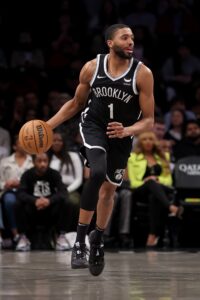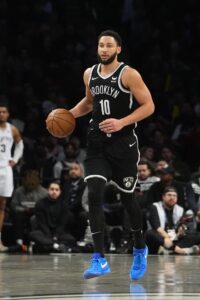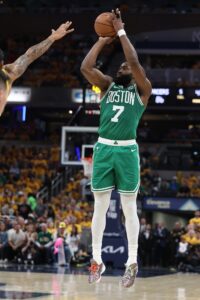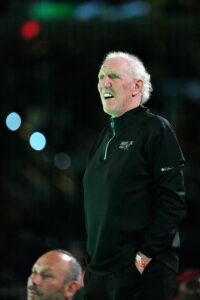The Nets were a top-six seed in the Eastern Conference in 2022/23, but that was largely due to the work of a pre-trade-deadline roster led by Kevin Durant and Kyrie Irving. After trading away Irving on February 6 (an injured Durant was moved three days later), the team went 13-17 down the stretch and was swept out of the playoffs in the first round by Philadelphia.
Those second-half and postseason results accurately reflected the level of the new-look roster, which underwent only marginal changes during the 2023 offseason. So it came as no real surprise that after hovering around .500 for much of the first half of this past season, Brooklyn eventually fell out of play-in contention, even in a weak Eastern Conference where the No. 10 seed finished with 36 wins. The team’s 32-50 record in 2023/24 wasn’t far off from its pace to finish the previous season.
While the Nets have some talented young players on their roster, none appear to be on a fast track to superstardom, so roster changes will be necessary to increase the team’s ceiling. But there’s no simple path to meaningful upgrades — Brooklyn is capped out this summer and doesn’t own a 2024 draft pick.
Going in the other direction and bottoming out in the hopes of landing a future star in the 2025 or 2026 draft isn’t really a viable path either, since the Nets don’t control their own first-round draft pick until 2028. As a result of the 2021 trade for James Harden, Brooklyn owes the Rockets its unprotected first-rounder in both 2024 (No. 3 overall) and 2026, along with swap rights in 2025 and 2027.
The situation isn’t quite as dire as it was for a few years in Brooklyn after the team’s misguided decision to mortgage several years of draft assets in a deal for Kevin Garnett and Paul Pierce, which lined up the Celtics to draft Jaylen Brown and Jayson Tatum in consecutive years. But the Nets will need some patience or some luck – or both – in order to reemerge as a legitimate contender in the East.
The Nets’ Offseason Plan
 Mikal Bridges is the best player – and asset – on the Nets’ roster, but he was miscast as a No. 1 option in 2023/24. His play declined in the second half, and while he’d never ask for a night off (he hasn’t missed a single game since entering the league in 2018), the veteran forward probably wouldn’t mind facing a little less defensive attention going forward. Bridges averaged just 15.7 points per game on 39.9% shooting in his final 31 games of the season.
Mikal Bridges is the best player – and asset – on the Nets’ roster, but he was miscast as a No. 1 option in 2023/24. His play declined in the second half, and while he’d never ask for a night off (he hasn’t missed a single game since entering the league in 2018), the veteran forward probably wouldn’t mind facing a little less defensive attention going forward. Bridges averaged just 15.7 points per game on 39.9% shooting in his final 31 games of the season.
Bridges makes perfect sense as the second or third option on a contending team, slotting into a role like the one OG Anunoby played for the Knicks — he can make three-pointers and handle challenging defensive assignments, but he’s better off as a secondary scorer, not as someone who constantly has the ball in his hands.
Whether Bridges ends up in a more appropriate role in Brooklyn or elsewhere is the question. As noted above, the Nets don’t have cap room or draft picks this summer, so the only way to turn Bridges into their No. 2 option in 2024/25 would be to trade for a star.
That scenario isn’t out of the question. Despite not controlling their own draft picks in the coming years, the Nets have an excess of future assets from other teams – namely Dallas and Phoenix – as a result of last year’s Irving and Durant trades. They also have a huge salary-matching piece in Ben Simmons, who will make $40.3MM on an expiring contract in 2024/25. Brooklyn has frequently been linked to Donovan Mitchell and could certainly be a player in the bidding for the Cavaliers guard or another star who hits the trade market this summer.
I’d question whether that’s the right approach though. Mitchell – or an equivalent star – would certainly make the Nets a better team, but he wouldn’t make them a legitimate title contender, and the cost (not only in trade assets but in the form of a long-term maximum-salary contract for the incoming star) would limit the club’s ability to pursue further upgrades.
Team owner Joe Tsai recently talked about taking a “longer-term approach” to team-building, and the hiring of a player development specialist like Jordi Fernandez as Brooklyn’s new head coach suggests the organization isn’t looking to take big swings after a 32-50 season unless a can’t-miss opportunity falls into its lap. I’d be surprised if the Nets make a blockbuster win-now deal this offseason — it makes more sense to build up the roster patiently and incrementally like they did the last time they went through a retooling process without their own draft picks.
Of course, there is another potential route available to the Nets: Bridges would have significant value on the trade market. Head of basketball operations Sean Marks and his front office have been adamantly opposed to trading Bridges despite reportedly receiving strong offers ever since they acquired him last February, and I understand that stance. His skill set is a coveted one and he’s proven he can play big minutes on a championship contender, having been a full-time starter for the Suns team that got within two wins of a title in 2021. You don’t want to trade that sort of player. Plus, as we noted earlier, making next year’s roster even worse wouldn’t benefit the Nets from a draft perspective as long as they don’t control their picks.
But what if they did control their picks? The Rockets, who have prioritized two-way players since Ime Udoka‘s arrival last spring, reportedly covet Bridges and were said to be prepared to put a strong offer on the table for him at February’s trade deadline.
Could it be in the Nets’ best interest, long-term, to consider a Bridges deal with Houston that would return their own 2026 pick and eliminate those ’25 and ’27 swap rights? Even if this year’s No. 3 pick isn’t included in the package (it could be), regaining control of those future picks would put Brooklyn in position to properly rebuild with valuable lottery picks in the next year or two. They could take the rebuild a step further by also entertaining trade offers for wings Dorian Finney-Smith and Cameron Johnson, both of whom would hold real appeal for playoff teams.
There’s no simple answer here for the Nets. While negotiating with the Rockets makes some sense on the surface, Houston would presumably recognize that Brooklyn’s own first-round picks are more valuable to the Nets than another team’s first-rounders would be, which would give the Rockets added leverage in any trade talks. And is Marks’ job security strong enough – after he was given the chance to hire his fourth head coach this spring – that he’d be willing to take another step backward by hitting the reset button again? I’m skeptical, which is why I consider Bridges more likely than not to open the 2024/25 season as a Net.
The decisions the Nets make on the trade market could have a huge impact on the franchise, but the front office has the option of simply taking a wait-and-see approach on that front. That’s not the case in free agency, where starting center Nic Claxton will become an unrestricted free agent this summer, giving him the ability to leave Brooklyn without the team getting any compensation.
The Nets will do all they can to avoid that happening, which might mean going up to $25MM per year – or even a little higher – to retain the young big man, who has emerged as a reliable rim protector and rebounder up front and still might have his best years ahead of him.
Fernandez and Marks didn’t do themselves any favors in their upcoming negotiations with the 25-year-old by declaring last month that they believe he’s a future Defensive Player of the Year, but he would’ve been in line for a major payday anyway. For what it’s worth, Jarrett Allen signed a five-year, $100MM free agent contract back in 2021 when his résumé wasn’t all that dissimilar to Claxton’s and a $20MM salary represented about 17.8% of the cap. Three years later, 17.8% of the projected 2024/25 cap would be almost exactly $25MM.
The Nets will also have contract decisions to make on Cam Thomas and Day’Ron Sharpe, though there’s less urgency in those cases — both Thomas and Sharpe are extension-eligible beginning this July, but would be on track for restricted free agency in 2025 if no deal is reached before the ’24/25 regular season begins.
As long as Brooklyn is able to re-sign Claxton, I wouldn’t count on a new deal for Sharpe this offseason. Big man Noah Clowney flashed real promise toward the end of his rookie season and if he continues to improve, he could push Sharpe for the role of Claxton’s primary backup next season. The Nets may want to see more from both players before deciding in 2025 whether to invest long-term in Sharpe.
Thomas is a trickier case. He’s a genuinely gifted scorer, having racked up 22.5 points per game in his third NBA season, but he doesn’t do much else on offense and has been a subpar defender. His ability to put the ball in the basket is valuable, but Brooklyn will likely be reluctant to break the bank on a player whose game outside of that one skill is so limited. It wouldn’t surprise me if the two sides have a hard time bridging the gap between the contract the Nets are comfortable offering and the one Thomas will seek.
It’s also worth noting that if the Nets simply keep Simmons’ expiring contract on their books for the 2024/25 season and don’t add any long-term money to their cap besides Claxton, they’ll be well-positioned to create real financial flexibility a year from now, when Simmons’ $40MM+ and Dennis Schröder‘s $13MM contract end. Locking up Thomas early would cut into that room, assuming his next deal starts above his projected 2025 cap hold of $12.1MM. That’s another argument in favor of holding off on a new deal for the 22-year-old until next year.
Salary Cap Situation
Guaranteed Salary
 Ben Simmons ($40,338,144)
Ben Simmons ($40,338,144)- Cameron Johnson ($23,625,000)
- Johnson’s cap hit includes a $22,500,000 base salary and $1,125,000 in likely incentives.
- Mikal Bridges ($23,300,000)
- Dorian Finney-Smith ($14,924,167)
- Dennis Schröder ($13,025,250)
- Cam Thomas ($4,041,249)
- Day’Ron Sharpe ($3,989,122)
- Noah Clowney ($3,244,080)
- Dariq Whitehead ($3,114,240)
- Jalen Wilson ($75,000)
- Partial guarantee. Rest of salary noted below.
- Total: $129,676,252
Non-Guaranteed Salary
- Jalen Wilson ($1,816,857)
- Partial guarantee. Rest of salary noted above.
- Jaylen Martin (two-way)
- Total: $1,816,857
Dead/Retained Salary
Player Options
Team Options
Restricted Free Agents
Two-Way Free Agents
Note: Because he’s a former first-round pick who had his third- and/or fourth-year option declined, Johnson will be an unrestricted free agent.
Draft Picks
Extension-Eligible Players
- Mikal Bridges (veteran)
- Extension-eligible as of October 1.
- Day’Ron Sharpe (rookie scale)
- Ben Simmons (veteran)
- Cameron Thomas (rookie scale)
Note: Unless otherwise indicated, these players are eligible for extensions beginning in July.
Unrestricted Free Agents
Other Cap Holds
Note: The cap holds for these players are on the Nets’ books from prior seasons because they haven’t been renounced. They can’t be used in a sign-and-trade deal.
Cap Exceptions Available
Note: The Nets project to be over the cap but below the tax line.
- Non-taxpayer mid-level exception: $12,859,000
- Bi-annual exception: $4,681,000
- Trade exception: $20,357,143
- Trade exception: $11,928,571
- Trade exception: $9,500,000
- Trade exception: $6,802,950
Note: Unless otherwise indicated, trade exceptions don’t expire before the regular season begins.
 Brown narrowly edged out teammate Jayson Tatum, who earned four of nine votes from media members for the honor at the conclusion of Boston’s 4-0 sweep over the Pacers. Brown received the other five votes (Twitter link).
Brown narrowly edged out teammate Jayson Tatum, who earned four of nine votes from media members for the honor at the conclusion of Boston’s 4-0 sweep over the Pacers. Brown received the other five votes (Twitter link).

 “Bill Walton was truly one of a kind,” NBA commissioner Adam Silver said as part of a longer statement. “As a Hall of Fame player, he redefined the center position. … Bill then translated his infectious enthusiasm and love for the game to broadcasting, where he delivered insightful and colorful commentary which entertained generations of basketball fans. But what I will remember most about him was his zest for life. He was a regular presence at league events — always upbeat, smiling ear to ear and looking to share his wisdom and warmth.”
“Bill Walton was truly one of a kind,” NBA commissioner Adam Silver said as part of a longer statement. “As a Hall of Fame player, he redefined the center position. … Bill then translated his infectious enthusiasm and love for the game to broadcasting, where he delivered insightful and colorful commentary which entertained generations of basketball fans. But what I will remember most about him was his zest for life. He was a regular presence at league events — always upbeat, smiling ear to ear and looking to share his wisdom and warmth.”